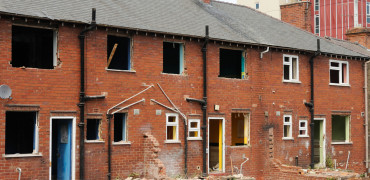Way back in December 2012, Prime Minister Theresa May claimed in an evocative speech that over a third of all new housing demand in Britain was as a direct result of immigration: “There is evidence that without the demand caused by mass immigration, house prices could be 10% lower over a 20-year period,” she commented.
Perhaps deliberately, this whipped tabloid newspapers into frenzy, with one Daily Mail headline from 2012 (which interestingly has since been amended) reported “How HALF of all social housing in England goes to people born abroad”.
…the real figure at the time in question was 8.6%. It now stands at 9%.
Around 91% of all new social tenancies are taken up by UK-born citizens.
Homebuilding has fallen short of meeting demand by quite some margin.
Misconception
Regardless of this, there is a common misconception held by a great deal of people in Britain that migrants are given priority when it comes to social housing allocation. The reality couldn’t be further from it.
A discussion paper from the London School of Economics recently found that “the level of discrimination perceived by white Britons in social housing is higher than that perceived by any other group in social housing.
And the only other ethnic groups reporting higher levels of perceived discrimination with any part of the state is the black community with the police, criminal justice and immigration authorities, a relationship that we know to be very troubled.”
The truth is that for decades now, homebuilding has fallen short of meeting demand by quite some margin.
The reasons are many, such as austerity in regard to public investment, inadequate funding, lack of suitable land and restrictive planning laws and regulations that have served to strangle our industry – all problems that need to be solved if we are to stand any chance of ending the housing crisis.
The true impact of Brexit social housing
The UK’s exit from the European Union will pose major challenges and opportunities for every policy area – including the growing issue of homelessness.
The ‘core homeless’ population in Great Britain stood at 160,000 households in 2016.
Brexit’s most immediate potential impacts on homelessness and the experience of people, are on EU nationals who are currently in Great Britain and experiencing homelessness.
But the risks and opportunities Brexit poses are not confined to EU nationals – they relate to the experience of British, EU, and other foreign nationals living in the country.
Trying to predict the precise impacts of Brexit on homelessness is impossible.
Short to long term
However, it is possible to set out the key factors that will influence how homelessness and the experience of homeless people will be affected by Brexit.
For example, the risk of some EU nationals failing to secure new immigration statuses, and so falling into or remaining stuck in homelessness is clear, whereas the potential for a post-Brexit Britain to increase housing access and affordability is far less certain.
In the short term, the key risks and opportunities are around the application process for new immigration statuses.
In the medium term, they focus on the future immigration system, the UK Shared Prosperity Fund, and impacts of Brexit on future domestic policy.
In the long term – and far less certain – are impacts on the economy as a whole and what this will mean for homelessness and social housing allocation.
In summary
Recent government figures on homelessness show that in the last year alone, 59,260 households were accepted as homeless by their local council – a rise of 22% over the last 5 years.
The loss of a private tenancy remains the single biggest cause of homelessness, with 18,750 households becoming homeless after an eviction from a privately rented home in 2016.
Since 2011, the rise in the number of households evicted from a privately rented home has accounted for 78% of the rise in homelessness.
This increase highlights the terrible impact that expensive and unstable private renting is having on people’s lives.
What's worse is that behind these shocking statistics, there are thousands more renters living in constant fear that just one slip up - like a cut in hours or sudden rent rise – could leave them homeless.
It seems then that Brexit won’t be like a magic wand to wave over the social housing sector; the only solution is to fix our broken housing system by building the genuinely affordable homes we so desperately need.
Joe Bradbury is digital editor of Housing Association magazine




